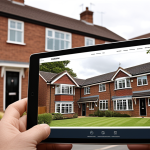Key Technologies Transforming UK Healthcare Efficiency
Healthcare technology UK advancements are revolutionizing how medical services operate, greatly improving efficiency across the system. One of the most impactful innovations is the widespread implementation of electronic health records (EHRs). These digital records consolidate patient information into a centralized, accessible format, allowing healthcare providers to quickly retrieve and update patient data. The result is a streamlined patient data management process that reduces duplication, minimizes errors, and accelerates clinical workflows.
Telemedicine is another transformative technology expanding care access in the UK. With telemedicine platforms, patients can consult healthcare professionals remotely, reducing the need for in-person visits. This not only improves convenience but also addresses challenges related to geographic barriers and limited appointment availability. Telemedicine adoption facilitates timely interventions, especially for chronic disease management and routine follow-ups.
Also read : What Are the Key Milestones in the History of UK Healthcare Development?
Artificial intelligence (AI) in healthcare further enhances efficiency by supporting diagnostics and treatment planning. AI-powered tools analyze medical images, pathology reports, and patient data to assist clinicians in making faster, more accurate decisions. For example, AI algorithms can detect anomalies in scans that might be missed by the human eye, leading to earlier diagnosis and better patient outcomes. Moreover, AI helps personalize treatment plans, optimizing care delivery while reducing unnecessary procedures.
These key technologies—electronic health records, telemedicine, and AI in healthcare—are synergizing to create a more responsive, efficient healthcare ecosystem in the UK. Together, they address critical operational bottlenecks and pave the way for a modernized healthcare experience that benefits both patients and providers.
Also to read : Why Is the UK Health Care System Facing Challenges Today?
Impact of Innovative Technologies on Patient Outcomes
Technological advancements in healthcare efficiency have markedly transformed patient outcomes across the UK. One key benefit is the enhanced speed and accuracy of diagnosis enabled by AI in healthcare. For instance, AI-powered diagnostic tools analyze complex medical data faster than traditional methods, allowing clinicians to identify conditions early and initiate appropriate treatments. This rapid processing not only reduces waiting times but also increases diagnostic precision, minimizing misdiagnosis risks.
Another significant impact is the reduction in medical errors through improved data accuracy and care coordination. Electronic health records (EHRs) play a central role here by ensuring consistent access to up-to-date patient information. When multiple healthcare providers share the same accurate records, medication errors and redundant tests decline, directly contributing to safer patient care. This interconnected data system also streamlines communication among care teams, enhancing treatment consistency.
Real-world examples further illustrate these technology benefits. Patients undergoing telemedicine appointments experience timely interventions without traveling, which is especially valuable for those managing chronic illnesses. The familiarity and convenience of remote consultations improve adherence to treatment plans, leading to better health outcomes. Similarly, AI algorithms that detect subtle anomalies in imaging have resulted in earlier cancer diagnoses, saving lives through timely intervention.
Collectively, these technological advances in electronic health records, telemedicine, and AI in healthcare foster a more responsive and accurate care environment. By accelerating diagnosis, reducing errors, and enhancing coordination, they substantially elevate patient experiences and health results.
Cost Reduction and Resource Optimisation in UK Healthcare
Technology advances in the NHS are driving significant healthcare cost reduction while improving operational efficiency. Automation plays a key role in minimizing manual tasks such as appointment scheduling, billing, and record-keeping, allowing staff to focus on clinical care. This shift results in substantial efficiency savings by reducing administrative overheads.
NHS trusts use various digital tools to optimize resource allocation. For example, workforce management software helps balance staff workloads and deploy personnel effectively, preventing burnout and ensuring coverage during peak demand. Similarly, AI algorithms analyze patient flow and bed availability to streamline hospital operations, reducing waiting times and unnecessary admissions.
Several case studies highlight these financial benefits. One NHS hospital reported a marked decrease in operational costs after integrating EHR systems with AI-driven analytics, enabling better demand forecasting and inventory control. By reducing duplicated procedures and streamlining processes, the hospital achieved cost savings that were reinvested into patient care services.
Overall, NHS technology adoption is transforming how healthcare resources are managed, demonstrating that strategic use of innovation can both lower costs and enhance service delivery in the UK.
Challenges in Implementing Healthcare Technology
Despite the clear benefits of healthcare technology UK advancements, significant challenges persist in their implementation. One major barrier lies in integrating new systems within existing healthcare infrastructures. Complex legacy systems often lack compatibility with modern solutions like electronic health records, telemedicine, and AI in healthcare, complicating seamless data exchange and workflow standardization. These integration difficulties can delay adoption and increase costs.
Data security and patient privacy concerns also present formidable obstacles. Healthcare providers must ensure that sensitive personal information remains protected amid increased digital data flow. Strict compliance with regulations such as the UK’s Data Protection Act and GDPR mandates robust cybersecurity measures. Any breach or misuse of patient data risks eroding trust and exposing institutions to legal penalties. Hence, safeguarding privacy while enabling efficient data sharing is a delicate balance in digital transformation healthcare.
Additionally, variability in technology access across regions exacerbates implementation challenges. Disparities between urban centers and rural areas limit the equitable deployment of innovations like telemedicine, which relies heavily on robust internet connectivity. This uneven access impacts the consistency of care delivery and may widen existing health inequalities. Addressing these geographical gaps requires targeted investments and infrastructure improvements.
In summary, overcoming healthcare technology challenges UK faces involves addressing system integration hurdles, ensuring data security and privacy, and bridging regional disparities. Successful digital transformation healthcare demands coordinated efforts that align technical, regulatory, and infrastructural factors to fully harness technology’s potential.
Future Trends and Opportunities in UK Healthcare Technology
The future of healthcare UK is strongly tied to ongoing healthcare innovation and emerging digital health trends. One key area poised to advance is the integration of AI with big data analytics, enabling more precise population health management. AI algorithms will increasingly analyze vast datasets from electronic health records and wearable devices to predict disease outbreaks, tailor preventive strategies, and personalize treatment at scale.
Government initiatives continue to fuel this digital transformation healthcare by investing in infrastructure and supporting research in next-generation technologies. Programs aimed at expanding broadband access address regional disparities, ensuring equitable technology adoption across urban and rural areas. Additionally, policy frameworks encourage interoperability standards, facilitating seamless data exchange between diverse healthcare systems and accelerating innovation diffusion.
Emerging technologies such as augmented reality and robotics are also set to redefine clinical workflows. For example, augmented reality can assist surgeons with enhanced visualization during procedures, while robotic automation may streamline routine tasks, freeing clinicians to focus on complex care decisions.
Together, these developments exemplify how the future of healthcare UK leverages cutting-edge tools to improve efficiency, enhance patient outcomes, and extend care access. The sustained commitment to healthcare innovation promises a more responsive and resilient healthcare landscape in the years ahead.





